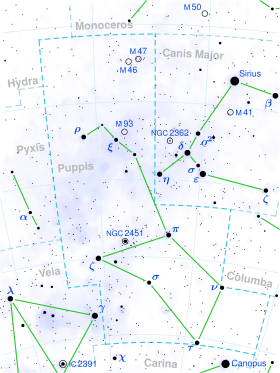| Observation data Epoch J2000 Equinox J2000 | |
|---|---|
| Constellation | Puppis |
| Right ascension | 07h 49m 14.29536s[1] |
| Declination | −46° 22′ 23.5422″[1] |
| Apparent magnitude (V) | 4.11[2] |
| Characteristics | |
| Spectral type | B0III[3] |
| U−B color index | −1.01[2] |
| B−V color index | −0.18[2] |
| Astrometry | |
| Radial velocity (Rv) | +24.00[4] km/s |
| Proper motion (μ) | RA: -4.37[1] mas/yr Dec.: +8.66[1] mas/yr |
| Parallax (π) | 1.98 ± 0.28 mas[1] |
| Distance | approx. 1,600 ly (approx. 510 pc) |
| Absolute magnitude (MV) | -4.37[5] |
| Details | |
| Mass | 19.3[6] M☉ |
| Luminosity | 3209[5] L☉ |
| Surface gravity (log g) | 3.95[7] cgs |
| Temperature | 31,200[7] K |
| Metallicity [Fe/H] | +0.16[5] dex |
| Rotational velocity (v sin i) | 49[3] km/s |
| Other designations | |
| Database references | |
| SIMBAD | data |
HD 63922 is a class B0III[3] (blue giant) star in the constellation Puppis. Its apparent magnitude is 4.11[2] and it is approximately 1600 light years away based on parallax.[1]
It is a multiple star; the primary has one close companion, Ab, at 0.3" separation and magnitude 7.19, and a more distant one, B, at 59.1" and 8.79 magnitude.[8]
- ^ a b c d e f Van Leeuwen, F. (2007). "Validation of the new Hipparcos reduction". Astronomy and Astrophysics. 474 (2): 653–664. arXiv:0708.1752. Bibcode:2007A&A...474..653V. doi:10.1051/0004-6361:20078357. S2CID 18759600. Vizier catalog entry
- ^ a b c d Ducati, J. R. (2002). "VizieR Online Data Catalog: Catalogue of Stellar Photometry in Johnson's 11-color system". CDS/ADC Collection of Electronic Catalogues. 2237. Bibcode:2002yCat.2237....0D.
- ^ a b c Hoffleit, D.; Warren, W. H. (1995). "VizieR Online Data Catalog: Bright Star Catalogue, 5th Revised Ed. (Hoffleit+, 1991)". VizieR On-line Data Catalog: V/50. Originally Published in: 1964BS....C......0H. 5050. Bibcode:1995yCat.5050....0H.
- ^ Wilson, R. E. (1953). "General Catalogue of Stellar Radial Velocities". Carnegie Institute Washington D.C. Publication. Carnegie Institution for Science. Bibcode:1953GCRV..C......0W. LCCN 54001336.
- ^ a b c Anderson, E.; Francis, Ch. (2012). "XHIP: An extended hipparcos compilation". Astronomy Letters. 38 (5): 331. arXiv:1108.4971. Bibcode:2012AstL...38..331A. doi:10.1134/S1063773712050015. S2CID 119257644. Vizier catalog entry
- ^ Tetzlaff, N.; Neuhäuser, R.; Hohle, M. M. (2011). "A catalogue of young runaway Hipparcos stars within 3 kpc from the Sun". Monthly Notices of the Royal Astronomical Society. 410 (1): 190–200. arXiv:1007.4883. Bibcode:2011MNRAS.410..190T. doi:10.1111/j.1365-2966.2010.17434.x. S2CID 118629873. Vizier catalog entry
- ^ a b Nieva, M.-F.; Przybilla, N. (2012). "Present-day cosmic abundances". Astronomy & Astrophysics. 539: A143. arXiv:1203.5787. Bibcode:2012A&A...539A.143N. doi:10.1051/0004-6361/201118158. S2CID 119206639.
- ^ Mason, Brian D.; Wycoff, Gary L.; Hartkopf, William I.; Douglass, Geoffrey G.; Worley, Charles E. (2001). "The 2001 US Naval Observatory Double Star CD-ROM. I. The Washington Double Star Catalog". The Astronomical Journal. 122 (6): 3466. Bibcode:2001AJ....122.3466M. doi:10.1086/323920. Vizier catalog entry
